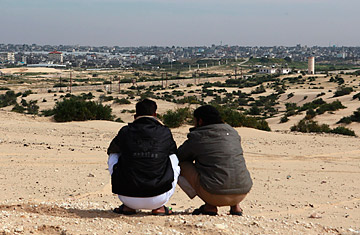
Bedouin in North Sinai's Rafah city overlook Gaza on March 7, 2012
Less than a few weeks after the resolution of one of the most serious crises to hit U.S.-Egypt relations in decades — a travel ban on six American NGO workers charged with illegally disseminating foreign funds — U.S. officials may already have another Egyptian crisis to contend with.
American soldiers are among the 2,000-strong Multinational Force and Observers (MFO) mission stationed in Egypt's Sinai peninsula to monitor the country's compliance with a 31-year-old peace treaty with Israel. But for nearly a week, hundreds of Bedouin tribesmen armed with machine guns and rocket-propelled grenades have been holding the men and women stationed at the MFO's main North Sinai base hostage. "They're not allowing the compound to receive anything [in terms of] resources or food and supplies," says Ahmed Abu Deraa, a Sinai-based journalist who visited the besieged base on Thursday. According to a statement on the MFO's website, the Bedouin have succeeded in blocking all transit in and out of the base, but the force has been able to use helicopters to provide "necessary transportation." The force said it was looking "to the government of Egypt as the host state of the force to restore the force's freedom of movement at the earliest possible moment." But Abu Deraa said that negotiations between tribesmen and Egyptian security forces broke down after a day and that only one military police vehicle remained in the base's vicinity.
The siege coincides with the bombing earlier this week of a Sinai pipeline that carries Egyptian natural gas to Israel and Jordan, as well as a largely symbolic — but unanimous — vote by Egypt's parliament to sever diplomatic ties with Israel. But the Bedouin in North Sinai say the siege has little to do with the Egypt-Israel peace treaty. "It's being carried out by the families of the people in prison," says Abu Deraa. On Thursday, an Egyptian state security court launched the retrial of five Bedouin suspects the state had charged with involvement in a series of terrorist bombings at Sinai beach resorts in 2004 and '05. Bedouin living near the base said the tribesmen had surrounded it in an effort to force the Egyptian government to release their kin.
In 2006 a court had initially sentenced three of the defendants to death and two others to life in prison, but Egypt's military rulers agreed to a retrial this week after a lobbying campaign by Egyptian and international rights groups who said the convictions were based on confessions extracted under torture.
This isn't the first time the residents of Egypt's eastern border zone have used hostages as a means of leverage. In recent months, Bedouin in the area have seized 25 Chinese workers, three South Koreans and two American tourists in separate incidents all geared toward the release of prisoners. All were ultimately released unharmed. But Bedouin activists and rights groups say the incidents speak more to the desperation of Egypt's most neglected province and its lack of security than it does to an international terrorism agenda. For years the Bedouin, historically a nomadic people who see themselves as culturally distinct from mainland Egyptians, have complained of high unemployment, institutionalized discrimination and little infrastructure. And in the year since a popular uprising ousted President Hosni Mubarak, their fortunes have changed little. "There is no state at all in Sinai. There are no features of the state in Sinai at all, except for the intelligence service," says Mosaad Abu Fajr, a prominent Bedouin activist and blogger who spent two and a half years in jail under Mubarak for protesting the regime's abuses in the Sinai.
The Egyptian government has long used security concerns near its border with Israel and the Gaza Strip to justify what Bedouin like Abu Fajr call the "militarization" of their territory and the routine harassment of their people. Following the resort bombings from 2004 to '06, security forces rounded up thousands of Bedouin, subjecting many of them to lengthy detentions without charge or access to lawyers.
Bedouin interviewed by TIME toward the end of the Mubarak regime, including tribal leaders and arms smugglers, often insisted that most of the peninsula's residents have little interest in challenging Egypt's peace treaty with Israel for the sake of international politics. Theirs is a story of domestic marginalization and neglect, they said. But this time, they've taken their protest to an international audience. Says Abu Fajr: "They want their complaints to reach the whole world because the Egyptian government is not competent to solve them."
— With reporting by Sharaf al-Hourani / Cairo
